The excitedly waited for National Haematology Top 2023 occasion returned last month.
The Top is arranged and sponsored by Janssen Sciences Ireland UC, with its program driven by an independent clinical committee. Members of the committee consist of: Teacher Patrick Thornton, Teacher Elisabeth Vandenberghe, Teacher Ruth Clifford, Teacher Peter O’Gorman, Dr John Quinn, Dr Amjad Hayat, Dr Derville O’Shea, Ms Geraldine Walpole, Ms Fidelma Hackett, Ms Liz O’Connell, and Ms Mary Kelly
T he top was chaired by Teacher Ruth Clifford, Expert Haematologist, University Medical Facility Limerick, with assistance from Teacher Siobhan Glavey, Expert Haematologist at Beaumont Medical Facility and Teacher of Pathology at the Royal College of Surgeons in Ireland. The goal of this year’s top was for clinicians to come together to share finest practice in the management of haematological malignancies consisting of numerous myeloma (MM) and persistent lymphocytic leukemia (CLL), examine the current medical understanding of their pathologies, and provide on existing and future management choices.
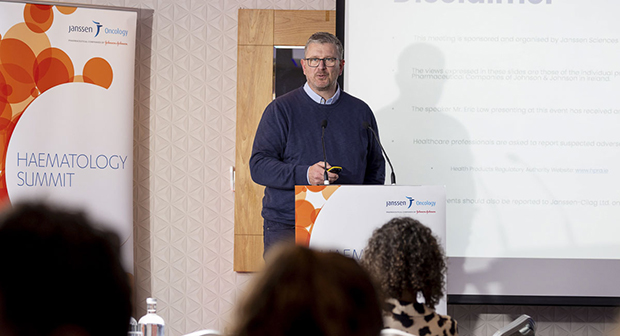
Eric Low, Creator of Myeloma UK
The conference opened with a discussion by Mr Eric Low, Creator of Myeloma UK and significant client supporter who described the development and practical effect of client organisations as being ‘exponential’, where they are ‘no longer on the outdoors attempting to get in’ however in reality starting to drive the program for research study and advancement. Some contributing aspects to this trajectory consist of clients having access to their own information, speaking with one another in real-time and throughout locations like never ever previously, and a relocation towards more formalised evidence-based advocacy.
In addition to developing relationships, Mr Low characterised the pursuit of client and market objectives in illness management as ‘mission-matching’, describing the capacity of optimised cooperation to improve medical practice that clients can gain from quicker.
The top likewise supplied an important chance for professional haematology nurses to talk about difficulties and chances in client care with Mr Low. Throughout the session, participants checked out the health care variations dealt with by clients dealing with haematological malignancies, highlighting the requirement to collaborate an integrated effort to style and carry out feasible options. Guests likewise talked about the significance of developing an across the country network of haematology nurses for sharing finest practice and mentoring those earlier in their professions.
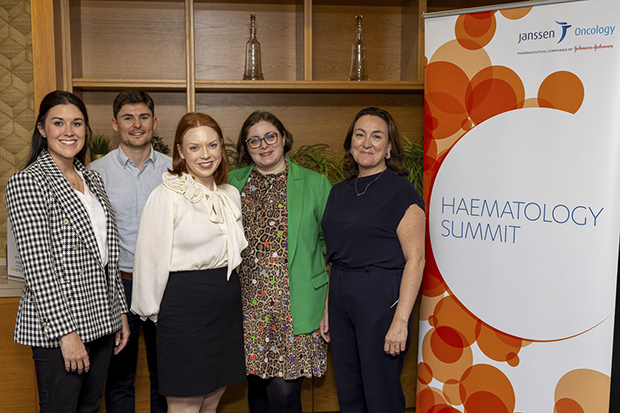
L-R: Dr Catherine Duane, Dr Conor Browne, Dr Rachel O’Brien, Dr Lorna Power, the NCHD case research study speakers with Top Chair, Prof Ruth Clifford
This was followed by 4 client case research studies provided by NCHDs contending for the Haematology NCHD Travel & & Education Bursary 2023 by the Haematology Association of Ireland and Janssen Oncology. Finalists consisted of:
- Dr Lorna Power, Haematology Registrar, Cork University Healthcare facility, who talked about the utilisation of bispecific immunotherapeutics in the treatment of refractory numerous myeloma with T-cell fatigue.
- Dr Rachel O’Brien, Haematology Registrar, Beaumont Healthcare facility, who checked out a case of classical Hodgkin version of Richter Improvement (HvRT) in persistent lymphocytic leukemia.
- Dr Catherine Duane, Expert Registrar in Haematology, Beaumont Medical Facility, ICAT-HRB Fellow, who examined a case of persistent extramedullary plasmacytomas in falling back numerous myeloma.
- The winner of the travel bursary was Dr Conor Browne, Senior Citizen Home Officer, Haematology Department at St James’s Healthcare facility, who provided on persistent lymphocytic leukemia with co-existing polycythemia vera, a persistent, progressive myeloproliferative neoplasm (MPN).
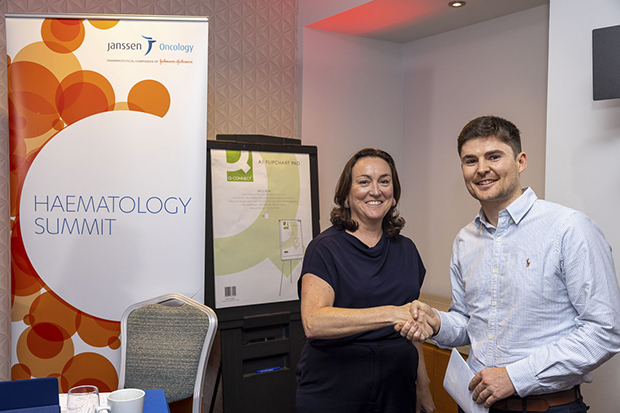
Prof Ruth Clifford with NCHD winner Dr Conor Browne
The case research studies showed en masse the heterogeneity of haematological malignancies in the Irish friend, along with the requirement to broaden the application of genomic analyses for patient-specific prognostication at treatment.
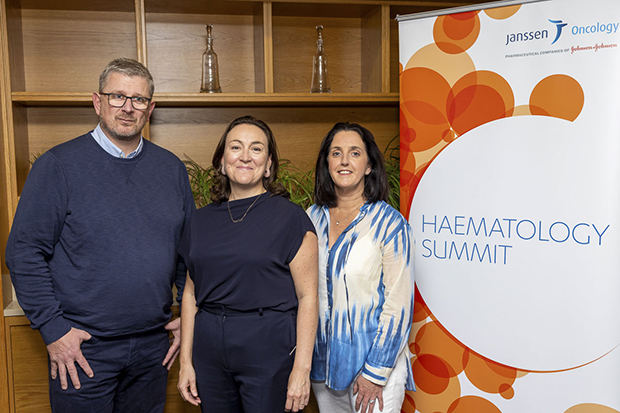
L-R: Eric Low, Prof Ruth Clifford, Expert Haematologist, University
Medical Facility Limerick, and Mary Kelly, ANP, Midland Regional Medical Facility Tullamore
In an effort to acquire insight into present and future methods for handling numerous myeloma and persistent lymphocytic leukemia, worldwide pre-eminent clinicians shared their proficiency and finest practices on integrating ingenious treatments into management methods throughout this year’s Top.
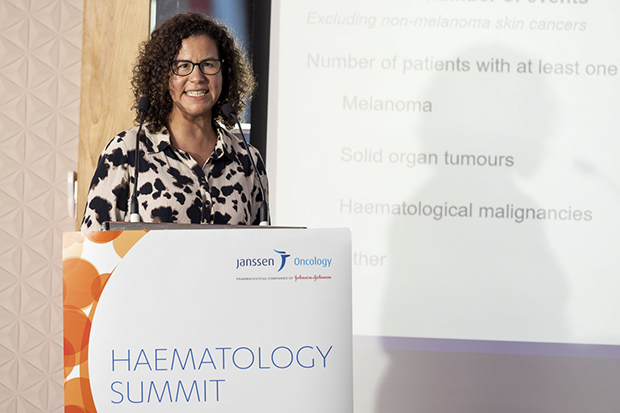
Dr Dima El-Sharkawi, Expert Haematologist, Royal Marsden Medical Facility
The very first of these was Dr Dima El-Sharkawi, Expert Haematologist at the Royal Marsden Medical Facility in London, who concentrated on persistent lymphocytic leukemia. Dr El-Sharkawi explained the blossoming accessibility of constant and set period treatments in frontline treatment choices. In the treatment of persistent lymphocytic leukemia, frontline therapies are going through a paradigm shift from blanket mix chemoimmunotherapy programs towards targeted medicinal methods with unique immunotherapies.
In picking a suitable frontline treatment, Dr El-Sharkawi kept in mind the effect of patient-related aspects consisting of age, co-morbidities, concomitant medication, hereditary aberrations and immunoglobulin heavy chain gene (IgHV) anomaly status. Integrating shared decision-making supports the choice of a practical method, specifically throughout 2nd line treatment where previous tolerability experiences can notify medical decision-making.
Dr El-Sharkawi examined findings from a number of medical trials which showed deep, continual actions in clients. The mix program of a little particle BTK inhibitor with a BH3-mimetic drug was checked out in trials CAPTIVATE and radiance with a comparable mix examined in style. As an outcome, such a mix ended up being licenced as the very first all-oral, once-daily, chemotherapy-free, fixed-duration program for persistent lymphocytic leukemia.
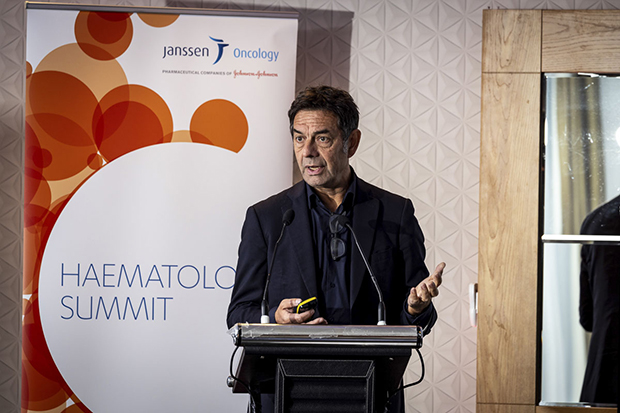
Prof Philippe Moreau, Expert Haematologist, University Medical Facility of Nantes
On hand to talk about the existing treatment landscape for numerous myeloma was Prof Philippe Moreau, Teacher of Medical Haematology and head of the translational research study program in haematology and oncology, at the University Medical Facility of Nantes, France.
In his opening remarks, Prof Moreau discussed the sequencing of drug programs and how “it is ending up being challenging now to discover the maximum series for our clients.” Moreau showed this intricacy by examining the CASSIOPEIA trial which compared the effectiveness of a quadruplet and a triplet mix, yielding beneficial actions for the previous over the latter with regard to depth of reaction and development complimentary survival.
” With a lot of brand-new choices,” he continued, “it can be challenging for clinicians to figure out the ideal series of restorative mixes at medical diagnosis, at regression and at the start of innovative illness.”
In addition to immunomodulators, brand-new classes of drugs have actually appeared in the last few years with unique molecular targets, for instance immunotherapies have actually been established to target B cell maturation antigen (BCMA) and G protein-coupled receptor, class C group 5 member D (GPRC5D).
For those with aggressive numerous myeloma, the majority of clients end up being triple class refractory after 2 lines of treatment. To analyze this, Prof Moreau discussed the findings from the LocoMMotion research study, a potential research study of real-life existing requirements of care in clients with fallen back and/or refractory numerous myeloma. Trial information showed the requirement for a formalised requirement of look after greatly pretreated, triple-class exposed clients with refractory relapsing numerous myeloma, highlighting the need for treatment choices with unique systems of action.
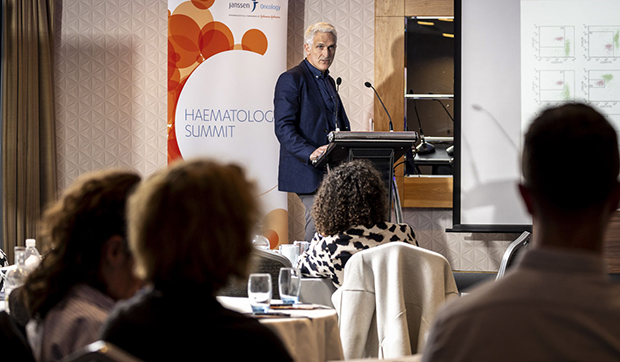
Dr Mark Catherwood, Expert Medical Researcher, Belfast City Medical Facility
The 3rd plenary speaker was Dr Mark Catherwood, Expert Medical Researcher at Belfast City Healthcare facility, who talked about quantifiable recurring illness (MRD) tools and diagnostics in persistent lymphocytic leukemia.
Formerly referred to as very little recurring illness due to the constraints of the innovation previously utilized to examine the measurement, MRD is a term utilized to explain the little number of cancer cells that stay after a client gets treatment.
Its medical worth depends on its capability show to what degree cancer has actually reacted to an offered treatment, figure out period of treatment and frequency of follow-ups for clients, display clients in remission, emphasize clients at greater threat of regression and support the recognition of clients who might gain from autologous stem cell treatment transplant and unique treatments.
Dr Catherwood compared the ability of normal MRD evaluation approaches to seeing an iceberg, where microscopy analyzes cancer cell morphology or the iceberg’s surface area, more recent tools like circulation cytometry and RQ-PCR can look underneath the surface area, while the most delicate and advanced tools can go deeper once again, such as Next Generation Sequencing (NGS) or Next Generation Circulation Cytometry (NGF). As anticipated, advanced high throughput innovations are usually more pricey and lengthy to release.
Concerning the ramifications for future medical utilisation, Dr Catherwood explained the innovative power of liquid biopsies in strong tumour treatment where distributing tumour DNA (ctDNA) is identified and determined in a peripheral blood sample, negating the requirement for a bone marrow biopsy, for that reason supplying a non-invasive method for illness tracking.
Dr Catherwood concluded by highlighting how level of sensitivity, uniqueness and standardisation are important to obtaining medically confirmed information, along with the influence on clients from sample collection. Eventually, the option of MRD test is identified by medical requirements, together with technical and useful factors to consider.
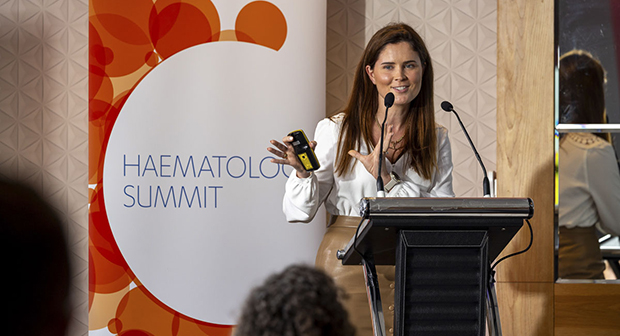
Prof Siobhan Glavey, Expert Haematologist, Beaumont Medical Facility
The last plenary speaker was Prof Siobhan Glavey, head of the Department of Molecular Pathology at the Royal College of Surgeons in Ireland who discussed threat evaluation utilizing gene expression profiling and MRD evaluation in recently detected numerous myeloma clients.
Prof Glavey provided preliminary findings from her continuous research study in cooperation with the Blood Cancer Network Ireland, the function of which is to assess if the threat status at medical diagnosis can forecast whether clients will accomplish MRD positivity/negativity and assistance to clarify the efficiency of frontline treatments in usage for transplant qualified numerous myeloma clients in conquering this hereditary threat.
The research study’s initial outcomes have actually revealed ~ 33 percent of clients have a high-risk hereditary profile at medical diagnosis, somewhat greater in the Irish population in contrast to worldwide standards (usually recorded as in between 19-26 percent).
The requirement to even more comprehend the standard hereditary threat of clients dealing with haematological malignancies in Ireland is self-evident. Through the acquisition and analysis of hereditary information particular to the Irish friend, it is hoped that policy choices will be much better notified and directed towards enhanced client care. ![]()
Referrals readily available upon demand.
Photos: Conor Healy/ Image It Photography
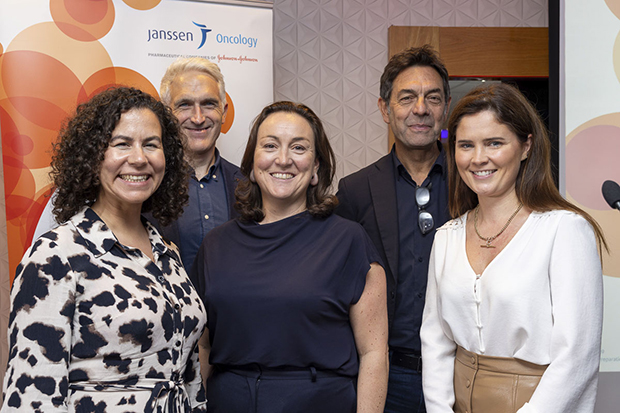
L-R: Dr Dima El-Sharkawi, Dr Mark Catherwood, Prof Ruth Clifford, Prof Philippe Moreau, and Prof Siobhan Glavey